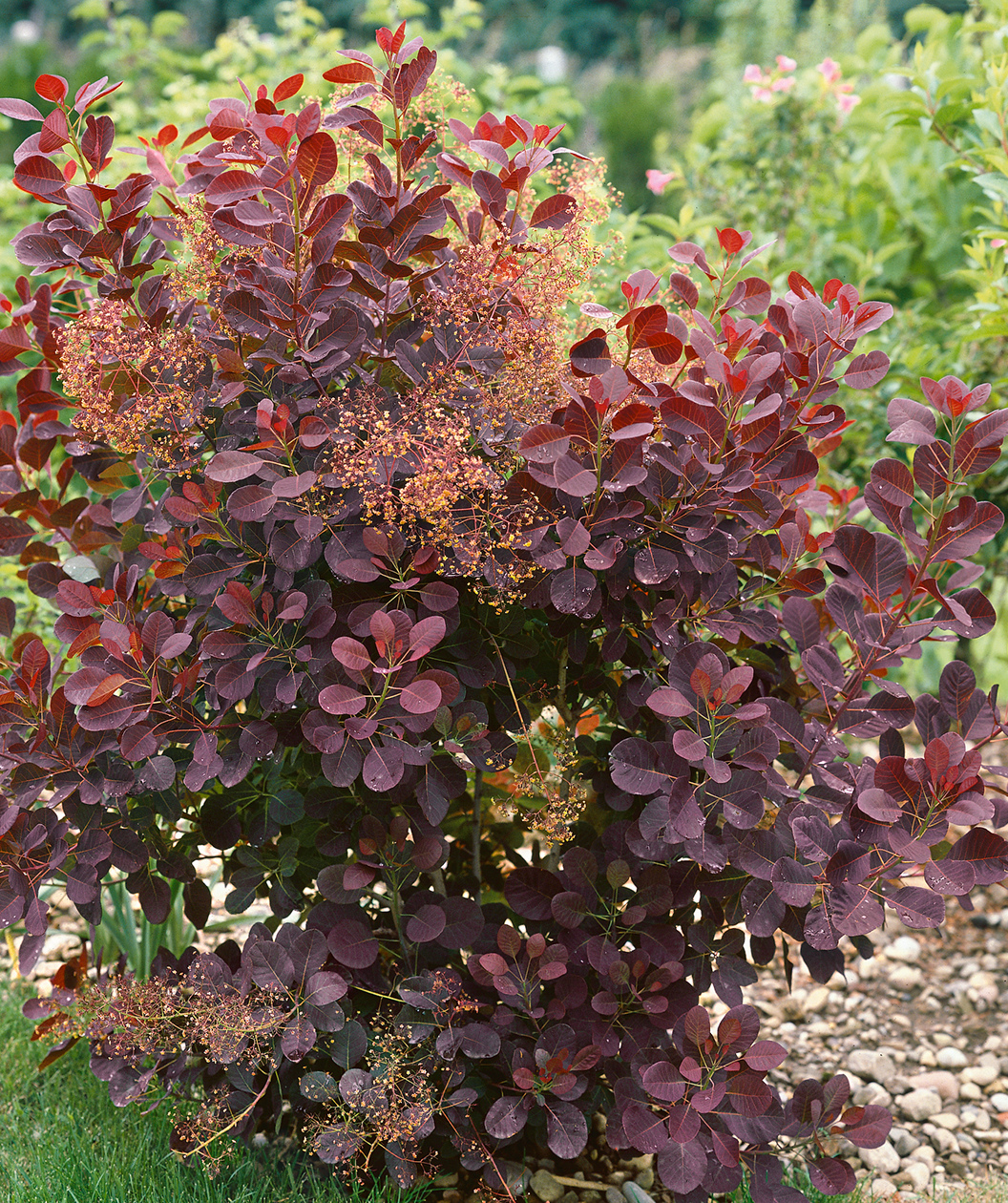

AWARD-WINNING MAGICAL CLOUDS OF MAROON
FEATURES:
- Spring foliage unfurls to a rich red, then darkens to velvety burgundy, keeping its color through winter
- Billowy purple seed clusters form in summer, giving the shrub its dreamy smoke-like appearance
- Airy pinkish-purple flowers will float above the leaves
- Drought tolerant, vigorous growth rate, and low maintenance
Growth Facts
- Hardiness Zone: 4-8
- Mature Height: 10-15' tall
- Mature Width: 10-12' wide
- Exposure: Full Sun/Part Shade
- Spacing: 10-12' apart
AWARD-WINNING MAGICAL CLOUDS OF MAROON
FEATURES:
- Spring foliage unfurls to a rich red, then darkens to velvety burgundy, keeping its color through winter
- Billowy purple seed clusters form in summer, giving the shrub its dreamy smoke-like appearance
- Airy pinkish-purple flowers will float above the leaves
- Drought tolerant, vigorous growth rate, and low maintenance
Growth Facts
- Hardiness Zone: 4-8
- Mature Height: 10-15' tall
- Mature Width: 10-12' wide
- Exposure: Full Sun/Part Shade
- Spacing: 10-12' apart
Why plant Royal Purple Smokebush?
Call the fire marshal and make sure there's no burn ban on, because Royal Purple Smoke Tree (or Smokebush) will bring a blaze of color to your landscape all season long. In spring it pushes out fiery red leaves, in summer it sends up smoke signals in the form of fluffy pink flowers, and in fall the purple foliage turns the color of hot coals. Plant this fast-growing but small ornamental tree in any of the beds around your home that could use some sizzle. Just don't be surprised when the neighbors call 911!
Smoke Tree belongs to a plant family composed of an odd mix of heroes and villains. Its cousins include such love-’em-or-hate-’em characters as Pistachios, Cashews, Mangos, Sumac, Poison Ivy, and Poison Oak. This species of Smoke Tree is scattered over a wide territory stretching from Southern Europe to Northern China. Its colored inner bark was once used to concoct a yellow dye called “young fustic.” This regal red variety came out of Lombarts Nursery in Boskoop, Holland. It traveled across the pond and gained entrance to American gardens in 1953. Quite a unique specimen here! Your Smokebush is covered with almost round purple foliage and decorated with puffy beige flowers giving the appearance of smoke. Plant some of these in your garden and you are sure to get some attention!
How to use Royal Purple Smokebush in the landscape?
Royal Purple Smokebush works well as a hedge or screening device in your landscape. It is great at hiding an unattractive element, such as a utility box. It also makes a glorious specimen plant when left to grow to full size.
Planting Zones
Hardiness Zone: 4-8
How To Plant Royal Purple Smokebush
Easy to grow in lots of sun, in average to poor quality but well drained to dry soils. Shade or wet soil will produce poor performance. Very close to pest free!
How To Water
Watering your Royal Purple Smokebush once a week or more frequently in warmer conditions. Once established, your plant will become tolerant to drought. Smokebushes will need a moderate watering roughly every 10-14 days in its actively growing stage.
How To Fertilize
When fertilizing the Smokebush, it's best to do so in the early spring with a balanced fertilizer. We recommend using our Elements Starter Plant Food in granular form for that extra boost in their growing seasons.
How To Prune
If you want your Smoke Bush to flower, prune it very lightly in early spring only as much as necessary to keep it in shape. If flowering is not a priority and you prefer loads of deep purple summer color, stems should be cut back hard in early spring. Cutting it back 50% or more to a framework will induce growth of vigorous new shoots with larger than normal deep purple leaves.




